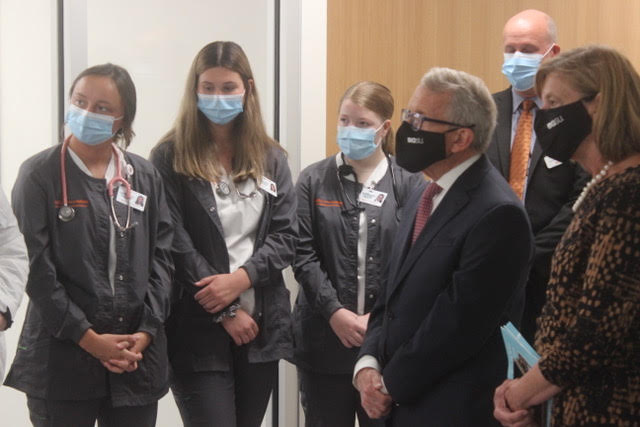Ohio Gov. Mike DeWine’s proposed package of expanded mental health services has drawn the near-unanimous approval of a panel of Ohio economists, according to a survey released this week. But one questioned how likely it is to actually happen.
DeWine in November renewed an earlier proposal to use $85 million in unexpended federal coronavirus aid to expand the range of services locally, do more research and further develop Ohio’s mental health workforce. DeWine also plans to ask for an unspecified additional amount when he submits a budget to the state legislature, the Cleveland Plain Dealer reported.
Ohio is one of the states hardest-hit by the opioid epidemic and the Health Policy Institute of Ohio in October reported that the frequency of Ohioans’ poor mental health days has been rising. Meanwhile, in 2018 and 2019, 25% of people surveyed said they couldn’t get mental health treatment when they needed it.
Of course, adequate mental health services are important to Ohioans’ quality of life. But a panel of economists convened by Scioto Analysis said improvements will also pay dividends by decreasing poverty and unemployment.
Of the 22 surveyed, 18 agreed that DeWine’s proposal would reduce poverty, three were uncertain and one disagreed.
“Access to mental health care is currently much easier for the well-off,” Ashland University economist Paul Holmes wrote in the comment section of the survey. “Expanded access would surely benefit those on lower incomes, along with providing additional service-sector employment.”
None of the economists who were uncertain or who disagreed with that question commented.
On the question of whether expanded mental health spending would increase employment, 19 economists agreed, one disagreed and two were uncertain.
“Mental health… and substance abuse issues affect labor market participation,” economist Curtis Reynolds of Kent State wrote. “Addressing them would help to increase labor market participation and (presumably) employment.”
Michael Jones of the University of Cincinnati said he lacked the expertise to make a judgment, so he was uncertain.
“I don’t have enough knowledge of the mental-health care system to know if current government funding is being efficiently allocated,” he wrote.
One economist, Diane Monaco of Heidelberg University strayed beyond the strict parameters of the questions to comment on whether DeWine is likely to get a big mental health package through the state’s gerrymandered, Republican-dominated legislature. Monaco noted that the U.S. House in September passed the Mental Health Matters Act with a single Republican vote and no GOP votes from Ohio.
“Now Governor Mike DeWine will be submitting his new and upcoming two-year budget proposal with many good intentioned mental health priorities in it in 2023,” Monaco wrote. “If passed by the OH gerrymandered Republican supermajority legislature and signed into law, DeWine’s ‘New Mental Health Priorities Proposal’ would provide grants to establish a pipeline for school-based mental health service professionals. Additionally, it would grow the number of mental health experts at elementary and secondary schools that are based in high-need locations which is something our students, families, educators care deeply about!!”
But, she added, “Do we think it will happen based on our CONTINUED current legislative environment and our current Governor’s inability to work within this environment? I think within this Ohio legislative environment with no change, new mental health priorities are not likely to happen.”





